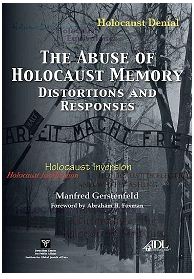Dr.Gerstenfeld held this lecture on the 8th of November in Helsinki Finland. The summary of the lecture is republished here with the author’s consent.
THE ABUSE OF HOLOCAUST MEMORY 2011-2012
Summary of Lecture in Helsinki 8 November 2012
By Manfred Gerstenfeld
The Holocaust has become a symbol of absolute evil in Western society. This happened gradually over the past decades. It was not the case in say, 1960. Yet one might have expected that with the Second World War more than 65 years behind us, the mention and memory of it would fade away. Indeed, there is in many circles what is termed “Holocaust fatigue.” These people do not want to hear anything anymore about the Holocaust.
At the same time, many others increasingly mention and discuss the Holocaust. It took 60 years until in 2005 the United Nations General Assembly named 27 January as International Holocaust Remembrance Day. On this day, every member state of the UN has an official obligation to honor the victims of the Nazi era and develop educational material about the Holocaust. This year the remembrance of the Holocaust is devoted to children.1
Why this Interest in the Holocaust?
What are the main reasons for this increasing interest in the Holocaust? We can identify some but do not know their relative weight. Memorial celebrations take place every year in many places. There are also new monuments still going up and new memorial centers are being inaugurated. One was at Drancy the major transit camp in France. There 63,000 of the 76,000 deported Jews transited before almost all of them were sent to their deaths. Yet both memorial days pass and monuments disappear from the public eye most of the time.
New historical research is being published about the Holocaust. Additional documents are also discovered. One example among many was that in October 2012, pictures taken by Hitler’s personal photographer Hugo Jaeger, of Polish Jews in the ghetto of Kutno between 1939 and 1940 were released. This was done to mark the official establishment of the Warsaw Ghetto in October 1940.2 Such research and discoveries are mentioned in the media. Thus they also play a role in the increased interest.
The increasing central place of the Holocaust in European societies is also due to a number of other important developments. One is that European societies have become increasingly secular, which means that their common norms and values have to a large extent broken down. In such an ideological and moral vacuum, one seeks out standards many people more or less agree upon. The Holocaust partly fills that function. It plays a role as a defining moment in European history.
The Holocaust touches upon very basic questions which many Europeans do not like to ask themselves explicitly. What was it in European culture and in European societies that made the Holocaust possible? This leads to a taboo question. Have the elements which made the Holocaust possible disappeared, or are they to some extent still with us?
The first nations which should ask these questions are Germany and Austria. Yet at present they do not seem inclined to do so. The present generation is not responsible for what their ancestors did. However, the Holocaust and Nazism can not be eliminated from German history. I would like to phrase the question somewhat differently. Many of the ancestors of contemporary Germans and Austrians were Nazi enthusiasts. Many other Germans and Austrians went along with the Nazis without hesitation. Is it at all imaginable that nothing of these attitudes has remained in these countries today?
Another element of importance for the increasing interest in the Holocaust is the growing uncertainty in the world. That requires more and more points of reference for events which take place almost daily. One example which has to be analyzed is the emergence of parties in European countries with many neo-fascist and neo-Nazi characteristics. This becomes problematic in particular if these parties enter Parliament.
Holocaust Abuse
While the interest in the Holocaust is growing there is simultaneously also a massive increase in the distortion of the history and the memory of the Holocaust. To understand the abuse of the Holocaust in our days, we have to start looking at it by category. In my book, “The Abuse of Holocaust Memory, Distortions and Responses” I have developed eight categories of distortion. These are: Holocaust Justification and Promotion, Holocaust Denial, Holocaust Deflection and Whitewashing, De-Judaization, Holocaust Equivalence,Holocaust Inversion, i.e the Portraying of Israel and Jews as Nazis, Holocaust Trivialization and Obliterating Holocaust Memory
The massive ongoing abuse of the Holocaust brings us to the question, what can be done about it? There is no single way to fight against the abuse of the Holocaust. Education is very important. So are memorials, monuments etc. The crucial point however remains not to let abuse of the Holocaust enter further in the public debate.
It is a task for everybody to react when Israel is called a Nazi state and to call on governments to bring the Iranian leaders Grand Ayatollah Khamenei and Mahmoud Ahmadinejad before an international court because of their Holocaust promotion and to do the same with Hamas. This could be the beginning of a much wider struggle against Holocaust distortion.
FOOTNOTES:

